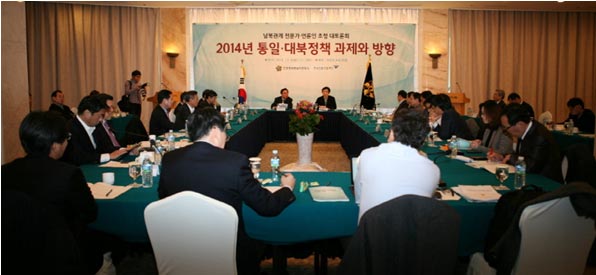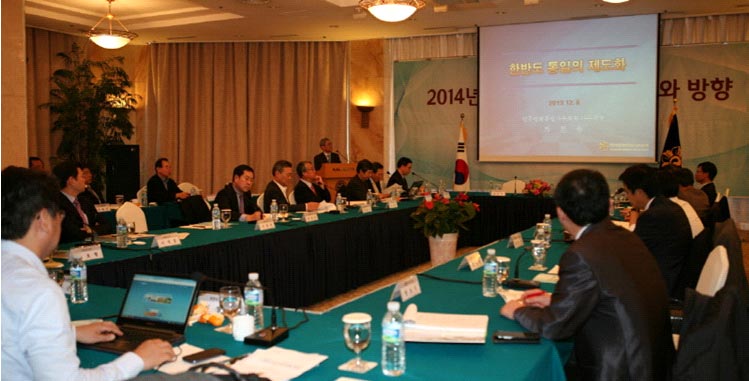| Open Forum with Specialists on Inter-Korean Issues and Journalists |
|---|
| Consultation & Advice Division, 2013-12-09 |
Seeking the Subjects and Directions of Inter-Korean Policy for Unification 2014,
11th Open Forum with Specialists of Inter-Korean Issues and Journalists Held in Seogwipo, Jeju
30 Specialists on Inter-Korean issues and journalists were invited to discuss the Korean Peninsula Trust-Building Process and the way to develop relations between South and North Korea, along with the future of the Korean Peninsula according to the relationship between the U.S.A. and China.
Hyun Kyung-dae, Executive Vice-chairperson of NUAC, said in his welcoming speech on the occasion of the Open Forum that Korea is the only country that achieved political democratization and economic development to such a great extent since 2002 among the developing countries, but we also need some opportunity to continue our survival, prosperity and future vision, so national unification is the right answer to the issues.
Hyun added, “It is very meaningful to have an open forum on a subject that we should consider to be the most important in this era. Inter-Korean policy for the national unification of the Republic of Korea is well defined in Article 4 of the Constitution of Korea, which states that the Republic of Korea seeks unification and formulates and carries out a policy for peaceful unification based on the principles of freedom and democracy.”
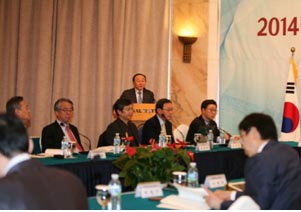 He also said, “President Park expects the NUAC to pour its best efforts into deducing national consensus for unification with the view point of the people’s full support for it to promote the inter-Korean policy of unification. I hope that this opportunity will a provide a new perspective on the unification talks to be able to implement the spirit of Article 4 of the Constitution breaking the past discussion approaching the unification issue from a functionalism point of view. Such kind of a new approach to the issue can be prepared theoretically by the specialist group and journalists attending this forum today.”
He also said, “President Park expects the NUAC to pour its best efforts into deducing national consensus for unification with the view point of the people’s full support for it to promote the inter-Korean policy of unification. I hope that this opportunity will a provide a new perspective on the unification talks to be able to implement the spirit of Article 4 of the Constitution breaking the past discussion approaching the unification issue from a functionalism point of view. Such kind of a new approach to the issue can be prepared theoretically by the specialist group and journalists attending this forum today.”
First Session: Korean Peninsula Trust-Building Process and the Method to Develop an Inter-Korean Relationship
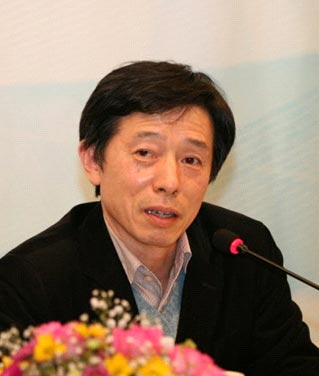 Park Hyung-jung, senior researcher of Korea Institute for National Unification analyzed the current status as follows in his lecture of “Korean Peninsula Trust-Building Process and Method to Improve Inter-Korean Relations,“ “North Korea tested Park Geun-hye’s government on the occasion of negotiating the normalization of Gaeseong Industrial Complex, Resumption of Sight Seeing at Mt. Geumgang and Reunion of Separated Families in the North and South, but the leaders in Pyeongyang did not feel attracted to this deal with Park’s government. So they seem to have made a decision to maintain a aggressive position until South Korea changes.”
Park Hyung-jung, senior researcher of Korea Institute for National Unification analyzed the current status as follows in his lecture of “Korean Peninsula Trust-Building Process and Method to Improve Inter-Korean Relations,“ “North Korea tested Park Geun-hye’s government on the occasion of negotiating the normalization of Gaeseong Industrial Complex, Resumption of Sight Seeing at Mt. Geumgang and Reunion of Separated Families in the North and South, but the leaders in Pyeongyang did not feel attracted to this deal with Park’s government. So they seem to have made a decision to maintain a aggressive position until South Korea changes.”
He forecasted that North Korea would press Washington through Beijing to resume the 6 Parties Talk and proceed with the talks through a tactical concession, with their ultimate goal of being recognized as a state possessing nuclear weapons.
But the possibility of excessive provocation and another nuke test by North Korea may not be high for the time being as wariness of China against the 4th nuke test and excessive provocation by North Korea is still high.
Major variables of North Korea that may affect the political situation of the Korean Peninsula in 2014, he expects, are ▲resistance by the groups purged by the Kim Jung-eun regime ▲ provocation against South Korea by the North Korean military facing a political crisis ▲ change of power topography by the fall of Jang Seong-taek ▲ drift of economic reformation
Bang Hyung-nam, editorial writer of the Donga Daily, said that Park’s government could not promote its inter-Korean policy with a passive attitude of coping with the situation after it broke out. The Korean government should try various policies preemptively, taking initiative but starting from little things that can be implemented by the two Koreas.
Professor Kim Yeong-jae of Cheongju University said, “Trust between the South and North can only start when North Korea changes according to our standards. Economic cooperation between them should be revitalized to operate the Korean Peninsula Trust-Building Process. In this regard, we need to review easing or relieving the May 24 measures and internationalization of Gaesung Industrial Complex, even though this would not be an easy task to accomplish in the short term.
Jeon Bong-geun, Professor of the Korea National Diplomatic Academy said, “The Basis of Inter-Korean policy was that South Korea and the U.S.A.-sanctioned economy and security of North Korea respectively but emerging China provides alternatives for the two areas. Accordingly, the old Inter-Korean Policy focused on sanction is losing its effectiveness gradually.”
Lee Hyo-won, Professor of Seoul National University's School of Law said that a relationship between the two Koreas cannot start after it is completely setup but instead it should be corrected and revised after the ship sails first. We need a system to manage the Inter-Korean Policy stably and the policy should be systemized if necessary and possible.
Second Session: U.S.-China Relation and the Future of Korean Peninsula
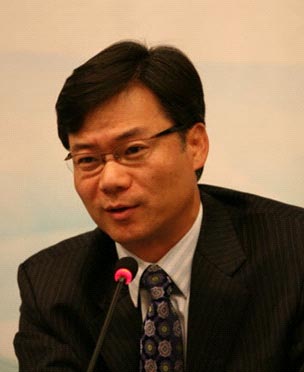 Park In-hwi, Professor of Ewha Womans University, presented his topic on the “Future of the Korean Peninsula According to Relations between the U.S.A. and China” and said, “The two giants will be more conflictive in areas of vital interest such as territory claims and energy but they will expand their cooperative areas such as the environment, international financing and developing natural resources.” He added that G2 order formed by Washington and Beijing would deepen with time and if the relationship between Beijing and Pyeongyang continues to be solid, unification of the Korean Peninsula might be more difficult.
Park In-hwi, Professor of Ewha Womans University, presented his topic on the “Future of the Korean Peninsula According to Relations between the U.S.A. and China” and said, “The two giants will be more conflictive in areas of vital interest such as territory claims and energy but they will expand their cooperative areas such as the environment, international financing and developing natural resources.” He added that G2 order formed by Washington and Beijing would deepen with time and if the relationship between Beijing and Pyeongyang continues to be solid, unification of the Korean Peninsula might be more difficult.
He considered the conditions needed for the national unification of the Korean Peninsula as ▲ Maintaining U.S. influences over the Korean Peninsula and North East Asia ▲ Incomplete diplomatic autonomy of China ▲ Insufficient ability of independent survival of North Korea. He also asserted that we should develop logic that unification of the Korean Peninsula will be helpful to the interest of the U.S.A. and China.
Jin Chang-su, a researcher at the Sejong Institute said, “We should pay more attention to various third party relationships and diplomatic relations with the countries of middle standing and ASEAN countries, but we are too inclined to lean towards the relation between Korea/U.S.A. and Korea/China. We may have more diversified options in the unification policy when bilateral relationships are diversified.”
Oh Jae-seok, Managing Director of Yonhap News Agency, said, “The latest event of executing Jang Seong-taek, the so-called second powerful person of North Korea, shows that sudden change in North Korea might come at any time when we do not expect it, as was the case of the collapse of the old U.S.S.R. and East Germany. In this regard, before we talk about the U.S.A. and China relationship, we should check the contingency plan or emergency plan of the inter-Korean relationship first.”
Park Chan-bong, Secretary General of NUAC said in his keynote address, “Two subjects of the inter-Korean relation and unification are formulated in our society but what I am afraid of is that we may lose the balance as our society was grasped excessively by the logic of functionalism. Therefore, we should seek an alternative to the functionalism more positively.”
He added, “There may be various unification theories but we should develop logic that can explain Inter-Korean relations and national unification systematically and theoretically and such theory should be supplemented with other logic. Also, we need to review the mechanisms and discussions that anticipate only a inter-Korean relationship of exchange and cooperation.”
He said that exchange and cooperation between South and North Korea is limited with their own power and system should back up for the relation between the two to proceed. We have no mechanism to control any violation of agreements executed by the two parties. There should be some penalty clause against breaching the agreements.
